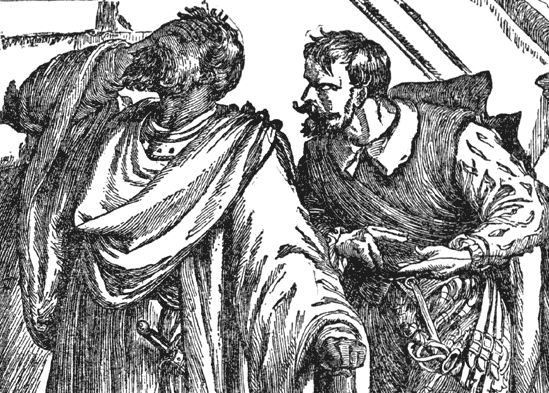I first experienced Othello in high school. I remember the teacher explaining to us that Iago’s motive isn’t what we think it is. He may say, “I want revenge because Othello slept with my wife,” but that’s just his justification for his actions. The real reason is that he’s the embodiment of pure evil, and that’s what makes him such a scary character. He has no reason for doing the things that he does.
It makes sense, and I like that interpretation. It makes Iago more interesting. I’ve never really questioned it.
When did this become the accepted interpretation? Iago gives us a motive:
I hate the Moor:
And it is thought abroad, that ‘twixt my sheets
He has done my office: I know not if’t be true;
But I, for mere suspicion in that kind,
Will do as if for surety.
He does say, “I don’t even care if it’s true,” which I suppose is evidence, but it could just as easily mean that Iago is the jealous type and doesn’t even want the rumor circulating that he’s a cuckold. He’ll later go on to imply that Cassio slept with his wife as well (“I fear Cassio with my night-cap too”) so maybe that’s just his thing.
Then there’s the racism angle. Iago goes right for the racist epithets when he’s trying to get Desdemona’s father upset:
Even now, now, very now, an old black ram
Is topping your white ewe.the devil will make a grandsire of you:
you’ll have your daughter covered with a Barbary horse;
you’ll have your nephews neigh to you; you’ll have
coursers for cousins and gennets for germans.
(I’ve always attributed the “thick lips” comment to Iago as well, but that’s actually Roderigo.)
So is Iago racist? Is that why he hates Othello, because of the color of his skin? Or, again, is he just saying these things because he knows they’ll drive Brabantio crazy?
I get how we can read between the lines and paint a picture of an Iago who says and does exactly what he needs to get what he wants without ever actually explaining why he wants it. I’m wondering when that became the standard interpretation of Iago’s motive and whether there are other clues in the text to support it. Why don’t we just say Iago is paranoid and call it a day? How come we watch the play and say, “Whoa, that dude is evil” instead of “Whoa, that dude is nuts”?


Laurence Olivier played Iago as gay and fixated on Othello. Which is interesting but doesn’t totally convince. in the end, I think it comes down to what Coleridge called ‘motiveless malignity’. And anyone that evil has to be nuts.
Ah, interesting – Coleridge, was it? That was my original motivation for the post, I was curious when that interpretation first became popular. Once you go looking for the term there’s all kinds of stuff written on the subject!
Here’s a good link to get started:
http://www.online-literature.com/forums/showthread.php?39900-Motiveless-malignancy
Othello picked Michael Cassio, a Florentine, to be his Lieutenant, a great affront to Iago. Iago thinks he is qualified to be chosen, not Cassio.
He explains his motive in I,1-33; and,”I follow him to serve my turn upon him.”
Had Othello chosen Iago instead of Cassio what then would his motive have been ?
I have read that Iago is the most evil, most wicked of all Shakespeare’s characters. Aaron would take affront at that! and maybe Richard 3 in 3 place. Malvolio forms an army and is “revenged” on the “whole pack…”
I feel like maybe Shakespeare was using Iago to introduce his audience to a psychopath character – the kind of person who would pretend to be your friend, while actually plotting your doom.
Iago is gay.
I honestly can’t tell if that’s just a weak troll or actual input on the subject, but you’re certainly not the first to think Iago might be gay.
https://www.sparknotes.com/shakespeare/othello/character/iago/
https://www.nybooks.com/daily/2016/12/14/iago-problem-choosing-evil-othello/
https://prezi.com/jjbzj8_3j_hj/iago-and-sexuality-in-othello/